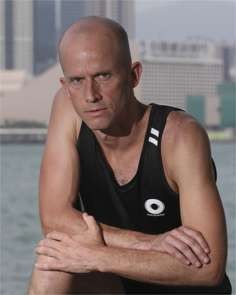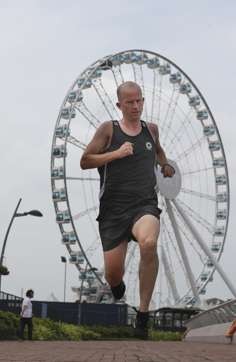
Six training and racing tips from a seasoned Hong Kong distance runner
Enjoy your running and listen to your body, says Chris Wharton, a half-marathon specialist who, right now, is preparing to race a much shorter distance in the Bloomberg Square Mile Relay
In a solitary sport such as running, opportunities to race in a team are rare. That’s why Chris Wharton is lacing up for the fifth time this year to take part in corporate team event the Bloomberg Square Mile Relay, despite the distance being a fraction of what he’s used to as a long-distance runner.
“It’s a little short for me, if I’m honest,” says Wharton, 41, a compliance manager at Macquarie Group and this year’s captain for the company. “But being part of a team can really add to the excitement of an event. It’s something many other sports people take for granted.”

Wharton has taken part in all the Hong Kong races to date, as well as two events in London. “What I really like about this is that it’s the team’s total time that really matters, so everyone has a part to play whatever speed they run at," he says.
“It also brings staff together from across the workplace. I’ve had the chance to make friends with people I wouldn’t otherwise have met.”
The Macquarie Group team, which came first in the event’s inaugural race in 2014 but came second to the ESF team last year, is back with an eye on reclaiming the gold. That one of Wharton’s friends and rivals, Brendan Keane, is in the ESF team only adds to the occasion. “Rivalry definitely adds a bit of spice to the event – I am definitely looking forward to the rematch.”
Wharton, who hails from Britain but spent part of his childhood in Hong Kong, began running with his father on Bowen Road, partway up The Peak, when he was nine years old.
“My dad was a keen runner and was my first running partner. I still remember our first run together on Bowen.”
These days, Wharton is a half-marathon specialist, but also dabbles in shorter distances and the full marathon. When training for a marathon he can run up to 130 kilometres a week.
“I love that running is such an accessible sport. There are many things that you can spend your money on: expensive shoes, GPS watches, gels and other extras, but all you really need is a pair of running shoes, shorts and a T-shirt and you are good to go. You can easily fit in a quick workout at lunchtime, or if you are travelling, it is a great way to see a new city.”

I don’t stretch as much as I should, but who does? Personally, I think the key is to build regular rest days into your schedule, and listen to your body. My advice to runners is if you are particularly tired, or feel a niggle coming on, then don’t be afraid to have two or three days off. I find that fixes the vast majority of problems.
Any tricks to give you and your team an edge this year?
You definitely get out of running what you put into it. There are no secret potions, supplements or short cuts that will help you reach your targets. You just need hard work and show persistence.
What do you think about when you’re running?
Mostly my mind goes off on random tangents. Towards the end of marathons, when it is getting hard, I break the distance down into ‘one lap of Bowen Road’, ‘half a lap of Bowen’, and other shorter segments. It seems to make the prospect more manageable.
How do you bounce back from running failures?
I gave up of any dreams of Olympic glory very early in my running career. Instead, I focus on simply enjoying it – both in training and in races. I don’t put too much pressure on myself. If I ever run slower than I hoped for, it is soon forgotten once I have had a couple of post-race beers.
What has running taught you that you bring to your professional life?
Hard work, commitment and perseverance are the keys to success.
Morning or evening – when’s the best time to run?
Personally I find a training run in the morning is good, then it’s done for the day and you don’t have to worry if you get caught up at work. However, a hard interval session not long after getting out of bed can be a mental battle. Typically, during the week my easier runs are in the morning, and harder runs are in the evening. This may change next year as I’m going to become a father soon, so I will have to fit my runs in whenever I can.
